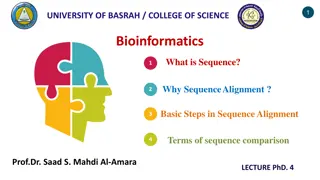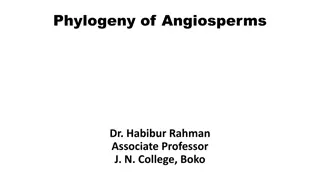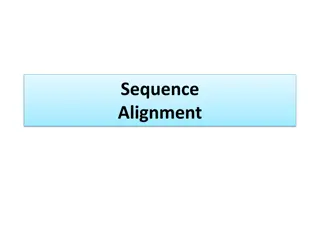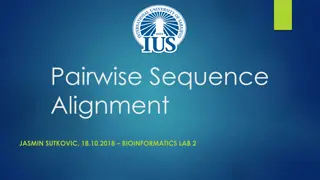Bioinformatics
Bioinformatics involves analyzing biological sequences through sequence alignment to uncover functional, structural, and evolutionary insights. This process helps in tasks like annotation of sequences, modeling protein structures, and analyzing gene expression experiments. Basic steps include compar
0 views • 6 slides
Understanding Phylogeny and Evolution in Angiosperms
Phylogeny is the study of evolutionary relationships among organisms, depicted in phylogenetic trees based on shared characteristics. This overview delves into terms like homology, analogy, monophyly, and co-evolution in angiosperms with an emphasis on taxonomy, systematics, and the evolutionary his
1 views • 25 slides
Understanding Sequence Alignment in Genetics
Sequence alignment is the comparison of DNA or protein sequences to highlight similarities, often indicating a common ancestral sequence. This process is essential in determining homology and functional similarities between sequences. Types of alignment include global and local alignment, with chall
0 views • 6 slides
Understanding Sequence Alignment and Tools in Bioinformatics
Explore the concepts of homology, orthologs, and paralogs in bioinformatics, along with different types of sequence alignment such as global, local, and semi-global. Learn about popular alignment tools like Blast and Fasta and how they are used for analyzing sequences. Dive into the world of NCBI an
0 views • 32 slides
Understanding Taxonomic Grouping in Microbiology
Taxonomic groups in microbiology are initially constructed from strains, with each strain representing a unique lineage. The concept of species within bacterial taxonomy, consisting of similar strains, is vital. Criteria for defining bacterial species are evolving, with DNA homology becoming a promi
0 views • 10 slides




